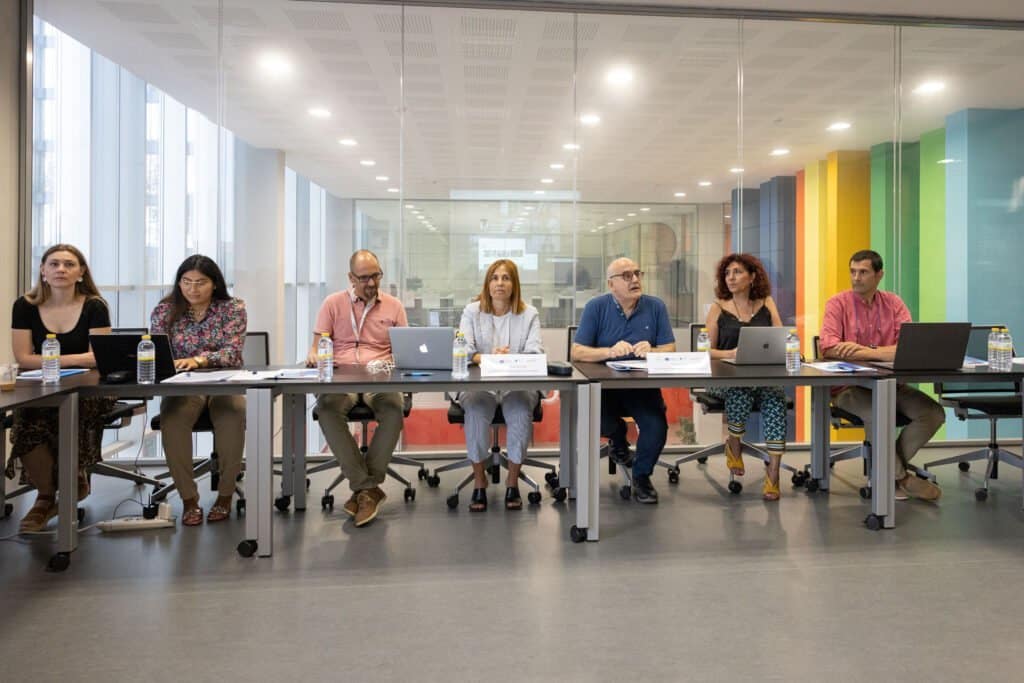The Horizon Europe project e-diploma on online training, coordinated by Inmaculada Remolar, director of the Institute of New Image Technologies (INIT) of the Jaume I University of Castelló through the research group «Interactive visualization», has begun its activity with the first meeting of the international consortium, made up of nine international entities that have met at the UJI during this week.
The vice-rector for Research, Jesus Lancis, who welcomed those attending the meeting, highlighted the great research work carried out by the INIT at the international level: «The INIT – he commented – has had a very important role in the last two years, in which The public university of Castelló has achieved 11 European projects financed with 4.5 million euros by the European Commission, including e-diploma.
For her part, the project coordinator, Immaculate Remolar, During his speech, he thanked the partners for their involvement in the project. As he explained, "e-diploma was born as an idea in confinement a few years ago and has matured into a real project thanks to the work, support and collaboration of all the partners and participants."
The e-diploma project, equipped with 3 million euros For the next three years, it is divided into four phases. In the first, e-diploma will examine the current online training ecosystem at European level. After extracting the strengths and weaknesses, we will consider what innovative technologies can support this online training system, both at the training levels of pre-university practical education (VET) and in higher education.
The second phase of the project is characterized by the co-creation of the most appropriate technologies for the different types of educational methodologies, while in the third phase the e-diploma platform will be developed, which will have three educational modules integrated by the topics Artificial Intelligence, Virtual and Augmented Reality, Interactive Technologies and Gamification Techniques. This platform and its training content will be tested through pilot tests in the different partner countries of the project.
Finally, in the fourth phase of the project, the platform will be redesigned and redefined. e-learning based on the results obtained in the pilot tests. Inclusion, accessibility and sustainability are key to the e-diploma project, which will create an e-learning environment always taking into account the potential, opportunities, barriers, accessibility and risks of using emerging technologies for teaching. In this way, a safe and inclusive space will be created for the educational community.

The European Commission also participated in the project launch meeting through Ángel M. Fuentes Mateos, research program officer, who will be in charge of the technical monitoring of the project. The rest of the participants in the meeting were the members of the consortium: the University of Tallinn (Estonia), the Delft University of Technology (Netherlands), the Budapest University of Technology and Economics (Hungary), the Universitat Politècnica de València ( Spain), INNOGROWTH- European Association for Innovation and Growth (Bulgaria), the CSI center for social innovation (Cyprus), the training and research cooperative ARIS (Italy) and the Brainstorm Multimedia company (Spain). The Universitat Jaume I-Empresa Foundation also participates in the project as an entity associated with the UJI, to provide support in the dissemination and communication activities of the project.
The international committee of experts made up of Vladislav Slavov, Vice Dean of the Sofia University of Technology (Bulgaria); Marini Catiuscia, Head of the European Office of the Policy, Training, Employment and International Department at Legacoop Umbria (Italy); Ulle Must, development director at the Estonian Education and Youth Board; Tobias Ley, professor at Danube University Krems and Tallinn University, and Frédéric Mertens of Wilmars, expert and professor in European and Gender Issues with extensive experience in higher education.
Finally, associated entities such as the Provincial Council of Castelló (Spain), CECAP Valencia-Business Association of Training Centers of Valencia (Spain), Finnovaregio (Belgium), RESET-Research and Education for Empowerment and Social Transformation (Cyprus), Florida Center de Formació (Spain), Estonian Education and Youth Board, IES Álvaro Falomir (Spain), Regional League of Cooperatives and Mutual Associations of Umbria (Italy), Satori Labs (France), János Neumann Computer Science Society (Hungary) , Sofia University of Technology (Bulgaria), Professor Doctor Asen Zlatarov University (Bulgaria), Bulgarian-German Vocational Training Center (Bulgaria) and the company Senseglove (Netherlands) have also been able to transfer all their support to e-diploma in this first consortium meeting.
Funded by the European Union. However, the views and opinions expressed are solely those of the author(s) and do not necessarily reflect those of the European Union or the European Research Executive Agency (ERA). Neither the European Union nor the authority that granted them can be considered responsible for them.



